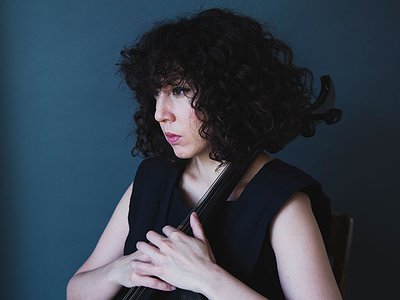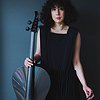How do you make use of technology? In terms of the feedback mechanism between technology and creativity, what do humans excel at, what do machines excel at?
Technology for me, as I said, has allowed me to perform alone with a much broader palette of sound that still feels like a solo performance. I feel like a human playing an acoustic instrument and manipulating the sound from it, live, in predetermined and precise-composed manners. Humans excel at making decisions, at organizing and arranging things that please themselves and each other in order to or serve some purpose of statement or expression. Machines can help humans be better at that.
Collaborations can take on many forms. What role do they play in your approach and what are your preferred ways of engaging with other creatives, including the artists performing your work?
Collaborations can be tricky - there are some in which people come together and everyone feels like they had to sacrifice themselves and beliefs, or even worse, feel exploited; the sum is a failure, integrity is lost. And the best are the literal opposite, when everyone brings something real to the table and no one sacrifices anything, and the sum is something that’s greater than anything anyone could have done alone. I prefer to collaborate with people who are good listeners and who are sensitive and intuitive, as I feel these traits help guarantee a mutually fulfilling collaboration.
How is writing the music and having it performed live connected? What do you achieve and draw from each experience personally? How do you see the relationship between improvisation and composition in this regard?
As a performer playing someone else’s work, I often, and maybe this is a bit egotistical, perform it as if I had written it, as I desire for the audience members to know how dedicated I am to its performance. But generally, I mean that when I perform music, whether it’s something I wrote or someone else wrote, I do so with complete dedication and commitment because I feel it is my responsibility as a performer to embody the music I’m playing. I am often performing music I wrote for myself too, so that connection is obviously quite direct, and it is quite rewarding to have the freedom, in a concert, to begin my own composition and then feel inspired to begin improvising. I feel lucky to have this freedom, to do whatever I feel.
Time is a variable only seldomly discussed within the context of contemporary composition. Can you tell me a bit about your perspective on time in relation to a composition and what role it plays in your work?
Time is very important in my work as most of it is comprised of durations of events, be they drones or loops etc. I try to carefully choose long durations of events that slowly change or evolve, or sometimes end abruptly, to find ways to cheat time or suspend time, or confuse it. I think disorienting and disrupting the perception of time is one of the best things music can do.
There’s often a fine line between mesmerizing and boring though, so, it’s definitely something to consider closely.
How do you see the relationship between the 'sound' aspects of music and the 'composition' aspects? How do you work with sound and timbre to meet certain production ideas and in which way can certain sounds already take on compositional qualities?
Sound is almost more important to me than composition. If someone is playing solo Bach perfectly in tune and beautifully nuanced but with a horrible sound, then unfortunately for me the composition is ruined. I’d rather hear someone play an F for 15 minutes with beautiful sound. The world of electronic sound is relatively new to me and so I am at a stage where I am trying to get better sounds for my live performance (and inevitably this will affect my composition as well), so I’m exploring different pedals and also boutique pedals. It’s a wonderful and limitless world of gear and I am just getting started. As well I recently bought a hacked walkman that can be controlled by midi which will slow down and speed up a cassette tape. Working with Francesco in Berlin really turned me on to tape sound and especially the sound of tape being manipulated, and so the sound enabled by this wonderful device is definitely affecting both my performance setup and composition too.
Our sense of hearing shares intriguing connections to other senses. From your experience, what are some of the most inspiring overlaps between different senses - and what do they tell us about the way our senses work? What happens to sound at its outermost borders?
Chromesthesia is fascinating to me and while I don’t connect colors to pitches, I can say I see things when I hear music - shapes, lines, crests, etc. Music or sound can also affect my vestibular sense. I’ve never studied science but considering the gut and the brain are such complex jumbles of nerves, it comes as no surprise that unlikely connections can be made. I would imagine that there are creatures for all sounds to be heard by - like birds can hear sounds we can’t, so at its outermost borders, sound is still existing for something that can hear it.
Art can be a purpose in its own right, but it can also directly feed back into everyday life, take on a social and political role and lead to more engagement. Can you describe your approach to art and being an artist?
At the very least, I’m not hurting anyone. And at best, I am helping a little.
It is remarkable, in a way, that we have arrived in the 21st century with the basic concept of music still intact. Do you have a vision of music, an idea of what music could be beyond its current form?
I can’t imagine the very basic tenets of music changing much beyond what they are now, however I would like to imagine a future in which music is not made for the sake of ease and convenience as is the trend now. I would like to imagine difficult to build environments and structures made to experience sound and music inside of, wild acoustic environments that enable dramatic sonic experiences, in other words, for music alone to be a dramatic event and experience.



